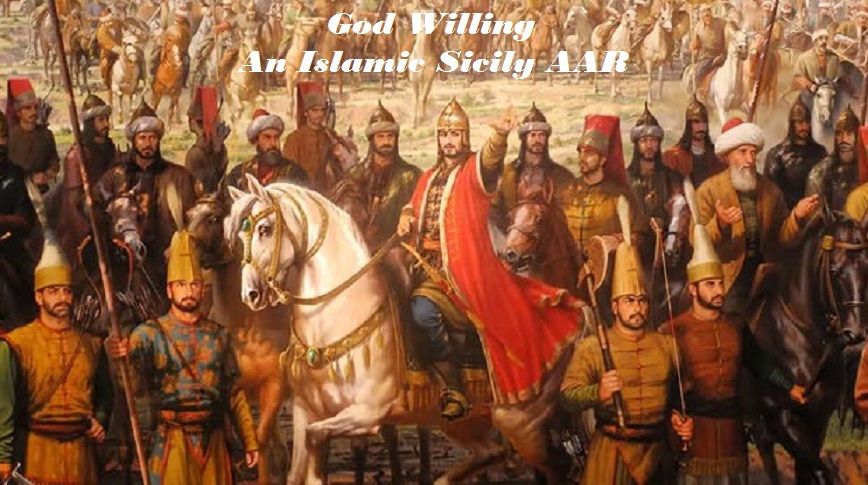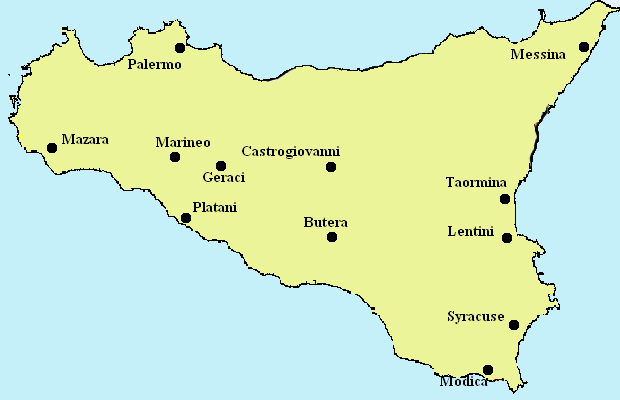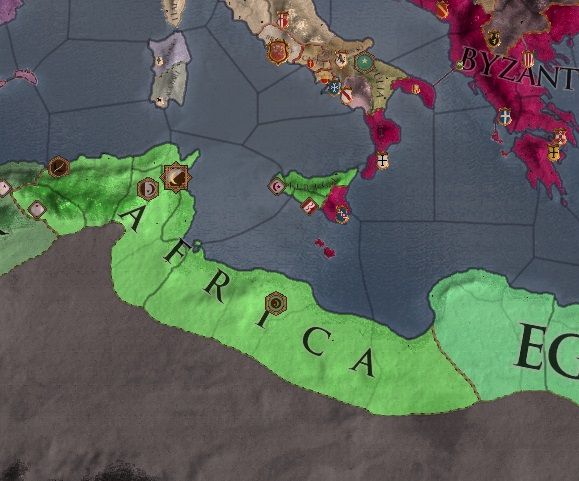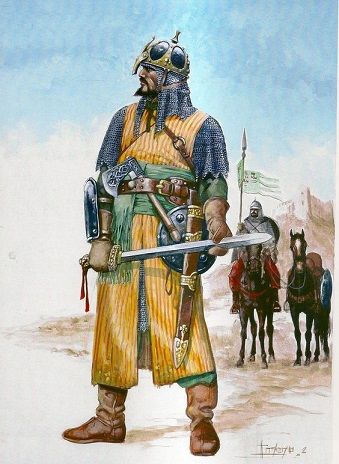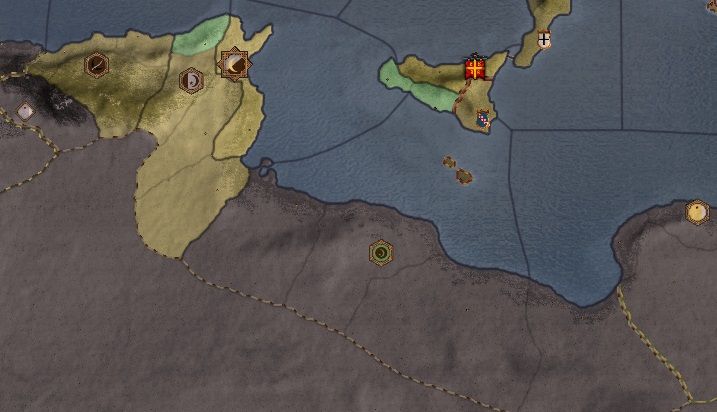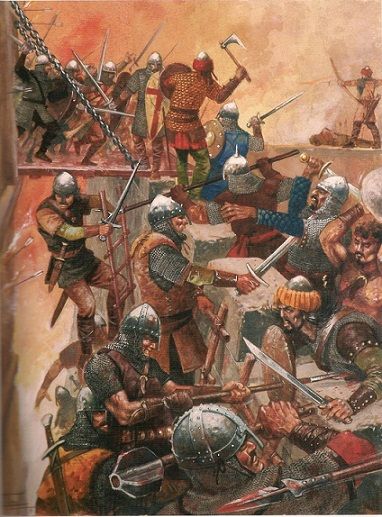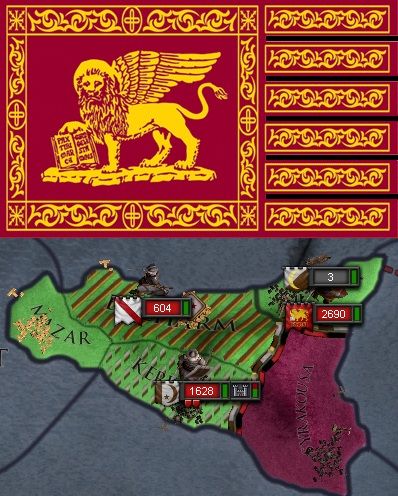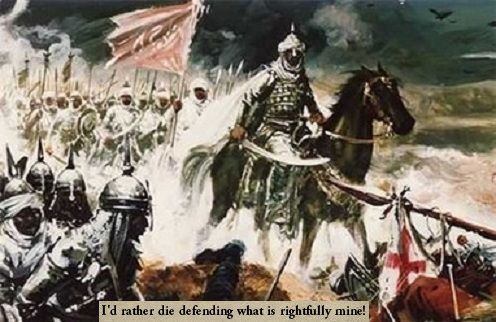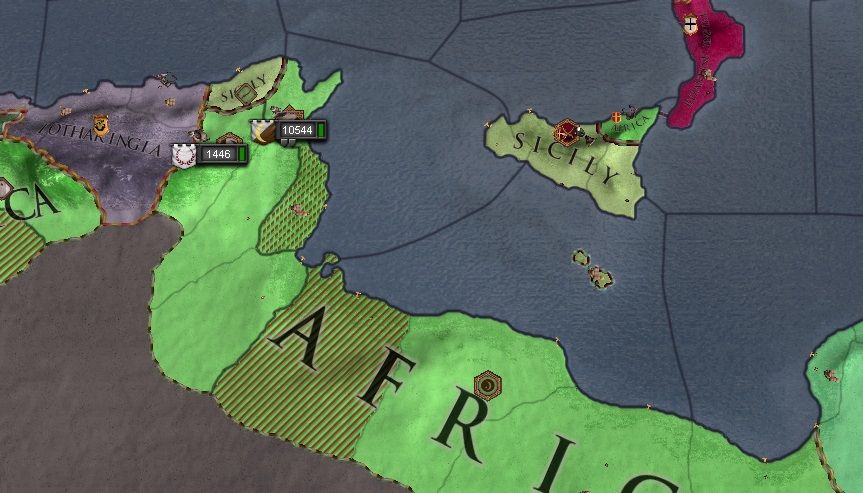
God Willing - An Islamic Sicily AAR
- Thread starter Tommy4ever
- Start date
-
We have updated our Community Code of Conduct. Please read through the new rules for the forum that are an integral part of Paradox Interactive’s User Agreement.
You are using an out of date browser. It may not display this or other websites correctly.
You should upgrade or use an alternative browser.
You should upgrade or use an alternative browser.
Hi, I’m Tommy4ever and I’ve been making AARs, on and off, since 2008. I’ve not been on these forums for a couple of years, so I’m not sure if there will still be anyone around who remembers my previous AARs (all of which you can access through my Inkwell link in my signature). My most recent one was a Scottish Megacampaign that got as far as the beginning of the 19th century – but I’m afraid to say can now be considered officially abandoned.
This AAR is based on an idea I’ve wanted to pursue for years but never got round to. I will start of as the Sheik of Mazar (the most westerly county in Sicily) in the 867 start date as seek to create a powerful Muslim state based on the island. This is also my first game of any serious length playing as a Muslim country, it was enjoyable to see that side of the game too.
The first update will come out tomorrow, and after that I’ll try to keep them coming roughly weekly. It will be written in my typical history book style, although unlike previous CK AARs. Hope you enjoy reading!
This AAR is based on an idea I’ve wanted to pursue for years but never got round to. I will start of as the Sheik of Mazar (the most westerly county in Sicily) in the 867 start date as seek to create a powerful Muslim state based on the island. This is also my first game of any serious length playing as a Muslim country, it was enjoyable to see that side of the game too.
The first update will come out tomorrow, and after that I’ll try to keep them coming roughly weekly. It will be written in my typical history book style, although unlike previous CK AARs. Hope you enjoy reading!
Last edited:
Glad to see you back to AAR writing.
I will surely follow your story (and the concept intrigues me).
I will surely follow your story (and the concept intrigues me).
I've wondered what it would be like to play an Islamic Sicily too, I'll be watching this thread.
Chapter One
The Birth of Muslim Sicily, 827-917
Islamic interest in Sicily dates back to the early decades of the faith’s emergence, with the first raids and tentative efforts at invasion of the Byzantine province taking place in the mid-seventh century. During the following century Arab ruler made repeated attacks on the island, but were unable to establish a permanent foothold. This would change after the rise of the Aghlabid dynasty to power in Tunis in 799. For years they looked enviously across the Strait of Sicily, before opportunity arose in the 820s. Then the Byzantine military commander Euphemius rose in revolt on the island, racing defeat to Imperial forces he invited the Aghlabids to invade Sicily and support his rebellion. The first Muslim troops crossed the Strait in 827 and, as the alliance with Euphemius broke down, began to lay down permanent roots. By the fall of Palermo (Balharm to its new rulers), the island’s greatest city, in 831 the majority of Western Sicily was in Aghlabid hands, yet they advanced far slower thereafter with their power moving gradually Eastward over the course of decades of stop-start fighting.
By 867 the Sultans in Africa ruled over most of the island, with the Byzantines confined to the East around the ancient city of Syracuse. War broke out yet again that year with the Muslims besieging the last great Roman fortress on the island until 869 when they were forced to fall back in the face of reinforcements from Greece. The situation grew more precarious the following year when the Sultan withdrew the bulk of his army from Sicily in order to counter an attack on Tunis itself by the Kingdom of Italy in alliance with the rebellious Emir of Tripolitania.
It was at this moment that Sheik Tegama, founder of the great Tegamid dynasty, rose to history’s attention. Tegama had arrived in Sicily with the first Aghlabid invaders decades previously, and after being made Sheik of Mazar on the Western tip of the islands in 832, became one of its key Muslim landowners. After a lifetime of service, in 870 he was left with the responsibility of defending Aghlabid Sicily while the Sultan’s attention was elsewhere. He faced a fearsome group of threats as his outnumbered army was confronted by a large Byzantine counter attack, rebellion by the island’s Greek Christian majority and division within the Muslim ranks as some elements sought to turn against the Aghlabids and bargain with Constantinople.
For six years Tegama defended the island with virtually no aid from Africa. Remarkably, he was able to defeat all his opponents, retaining control over Palermo despite a three-year long Byzantine siege and retaking Messina after it too was briefly lost. At the same time he seized control of the treacherous Sheik of Kerkent’s lands, and in doing so greatly expanded his personal domains through the South-Western coastline of Sicily. At the war’s conclusion in 876 the Sultan rewarded Tegama with control of Bizerte, to the West of Tunis. Yet, rather than be grateful for these new lands, the Sheik was incensed. After his service against the Byzantines he had expected to be named Emir of Sicily, granted control over Palermo and the authority to rule the island on the Tunis’ behalf. Instead, this power was granted to the Sultan’s feckless son – whose arbitrary and incompetent governance from Palermo greatly aggravated the Sheik.
When war broke out in Africa between the Sultan and his brother Ibrahim in 879, Emir of Tripoli, Tegama took his opportunity to attack. He moved swiftly to rout loyalist forces in Sicily and bring Palermo under siege, taking control of it in 882 before storming Messina in 883. With the Ibrahim defeating his brother’s armies and advancing towards Tunis, the Sultan presented Tegama with offer in. He agreed to recognise the Sheik’s control over Palermo, although not Messina, but in exchange demanded that he sail to Africa to aid in the fight against Ibrahim. Tegama eagerly accepted the opportunity to make his ownership of the great city permanent and quickly moved to join the Sultan.
After several years of fighting in Africa Sicily came under threat when the Venetians launched an invasion in 889. Fearing the loss of his lands the Sheik hurried back across the Strait, but was unable to defeat the Italian incomers. Within months his army was crushed, Palermo was captured and the island overrun. As Tegama retreated back to Africa all seemed lost. However, fortune shone on the embattled Sheik as Ibrahim of Tripoli was captured in a battle near Gabes, and the Aghlabid civil war met an abrupt conclusion. With peace restored in Africa, the Sultan gave Tegama command of a large army tasked with the reconquest of Sicily. He returned to Sicily in 892 and within two years had ejected the last Venetian troops from the island – firmly restoring both his own power and that of the Sultanate. Thereafter peace returned to the island, the now elderly Tegama ruling from Palermo until his death in 898.
Tegama’s son, the new Sheik Hotha, was obsessed by his desire to finally eject the Byzantines from Sicily. In 905 he got his opportunity as, while the Empire reeled from internal conflicts, garrisons on Byzantinium’s Western frontier were left dangerously undermanned. Acting independently of the Sultan, Hotha moved swiftly to seize Syracuse and Malta – and then defeating a small relief force. Almost immediately from this victory the Sheik fell into conflict with the Sultan, who demanded that the new lands be handed over to him. Hotha was unwilling to give up his new conquests and chose to call the Sultan’s bluff.
To the Sheik’s dread, the Sultan was more than willing to fight, beginning more than a decade of warfare between the Tegamids and Aghlabids. The conflict was further complicated by the intervention of the Latins, who invaded Africa’s Western provinces as part of a process in the late ninth and early tenth century that saw Christian states established through Algeria and Morocco, and of the Egyptians who sent thousands of troops to aid the Sultan. Both these foreign powers became involved in this internal conflict, with the Latins indirectly aligned to Palermo and the Egyptians to Tunis.
The conflict initially went very poorly for Hotha as his armies were sent into retreat, Bizerte and much of Western Sicily was lost and Palermo was briefly brought under siege. At the same time Lombard pirates seized Malta and used it as a base from which to menace the Sicilian and North African coastline for years. The Tegamids were saved by the pressure being exerted by the Latins in Africa, whose victories forced the Aghlabids to divert troops away from Sicily – providing the breathing space that allowed Hotha to begin his fightback. By 913 Sicily was fully under his control, while the Lombards had also been ejected from Malta. With the aid of a Latin fleet, Hotha then crossed the Strait and besieged Tunis itself – entering the African capital in 915, before proceeding to recapture Bizerte the following year.
After more than a decade of fighting, peace was agreed in 917. The Tegamid realm was recognised as the independent Sicilian Emirate, with control over all of the island outside of Messina as well as Malta and Bizerte in North Africa. With the Aghlabids also losing territory to the Latins, there had been a decisive shift of power in the Central Mediterranean. With that, the first self-governing Sicilian Muslim state, which would shape the coming century of world history, was born.
A prologue and a first chapter rolled into one! Updates for this AAR are going to be more fast paced than the previous CK and EU ones I have done which have tended to be on a one reign per post basis. Here I'm going to just have chunks that make sense as a coherent period of a few decades for each update.
Welcome to all those who posted! I recognise some old veterans still around from my previous times here and some new ones, I hope both enjoy the AAR .
.
Welcome to all those who posted! I recognise some old veterans still around from my previous times here and some new ones, I hope both enjoy the AAR
So the dynasty is established, a foundation upon which - perhaps - a great thing may be built.
Great to see you back and writing again Tommy! This looks to be a very interesting game. Hopefully you can take control so Italy never knows the name De Hauteville, right? 
This looks like it should be interesting. Can't wait to see where it heads from here.
Sicily has achieved political independence for now, but the geographic location of it makes it vulnerable so I'm inclined to think it will have to rely on external allies to maintain it. That said out of a such diverse population a lasting realm could also be built if there is tolerance.
I will also say that I'm very happy to see you back with another AAR and sad that the Scottish adventure ended, but this tale looks equally promising.
I will also say that I'm very happy to see you back with another AAR and sad that the Scottish adventure ended, but this tale looks equally promising.
You nearly own all of Italy. The question is will you try to take the weaker city states of Napoli, Capua, and Beneveto. They would most likely have to be holy war causa belli that could draw Lombardic Italy into the fray. You could try to take other Mediterranean isles such as Sardinia, the Baleares, or even Corsica too. Maybe you'll just try to take land from the Ibadi states in north Africa, if any are still left seeing how Lotheringia is buttressed against the Kingdom of Africa.
In other words I'm curious to see what you do.
In other words I'm curious to see what you do.
Nearly all of Italy? Isn't that an overstatement of his position?You nearly own all of Italy.


